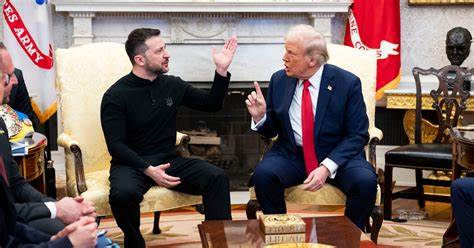by Admin
05/03/2025
In a pivotal moment for global geopolitics, United States President Donald Trump’s meeting with Ukrainian President Volodymyr Zelensky at the White House last Friday has sent a series of shockwaves through Europe.
This came after a series of recent events. United States Vice President J.D. Vance’s aggressive rhetoric at the last Munich Security Conference reiterated the United States’ decision to vote against a United Nations resolution supporting Ukraine’s territorial integrity and confirmed a vivid shift in Washington’s stance on the Russia- Ukraine war.
This departure from decades of United States foreign policy has left European leaders scrambling to reassess their security strategy.
In response to the fiasco at the White House during Ukraine’s presidential visit, European leaders convened in London on Sunday at the invitation of British Prime Minister Keir Starmer to formulate a peace plan for Ukraine.
While concrete details remain scarce, initial discussions reportedly included proposals for a peacekeeping force involving British and French troops.
One clear outcome of the crisis, however, is the growing assertiveness of the Nordic and Baltic states, which are now pushing for deeper European integration an initiative they had previously hesitated to embrace until the war between Russia and Ukraine broke out in 2022.
As Prodesq political analyst Temitope Oladeji observes, the decision of Nordic and Baltic nations to integrate with Western Europe initiatives is destructive and provocative toward a formidable lasting peace between Europe and Russia.
The push to join NATO will bring NATO missiles and soldiers closer to the Russian border and will further enhance future provocation with Russia as well as unending war in Europe.
In November last year, the United States opened its first missile base in Poland, the first United States missile base in the Baltic region, which prompted Poland to increase its military defense spending for 2025 to 4.7%. This signals a preemptive preparation for future military actions from Russia and has marked the United States missile base as a reason to attack Poland in the future.
However, Temitope highlighted the fact that in other parts of the continent, where pro-Russian and pro-Trump far-right factions have gained ground, the Nordic and Baltic states appear to be resisting such political shifts.
Meanwhile, Ukraine’s efforts to secure a security guarantee from the United States through a minerals resources agreement with Washington remain in jeopardy. President Trump had reportedly pressured Zelensky to sign the deal, but discussions have been stalled while Ukraine’s President Volodymyr Zelensky has reiterated his readiness to sign the agreement.
Prodesq political analyst Temitope Oladeji explained that Zelensky keeps misunderstanding the stance of President Trump’s meaning of security guarantees. During Trump’s political campaign, he made it vocal that he would end the Russian- Ukraine war and has constantly been working towards achieving his goal, pending a meeting with the Russian President Vladimir Putin later in the year.
Prodesq columnist Lateef Oyalola reiterates that Ukrainian President Volodymyr Zelensky wants to continue with the war against Russia while pointing out the responses from European leaders after the white house fall out between President Trump and Zelensky, Lateef explained further that the motive for the United Kingdom Keir Starmer to summon an immediate meeting of European leaders two days after the white house fallout and the promise of 2 billion dollars to purchase missiles signifies that the European leaders are against the peace agreement of their American counterparts.
However, China, on its part, has remained on the sidelines, observing the unfolding fallout between European leaders and President Trump.
Temitope Oladeji explained that with the European Union facing rising economic strain from increased defense spending and U.S.-imposed tariffs, China is likely to position itself as a vital economic partner after both Europe and China have been dealt a heavy blow by President Trump’s trade war.
Though such an alignment would be unusual given Beijing’s support for Russia, the shifting geopolitical landscape under Trump’s leadership may force European leaders to explore unconventional partnerships.

